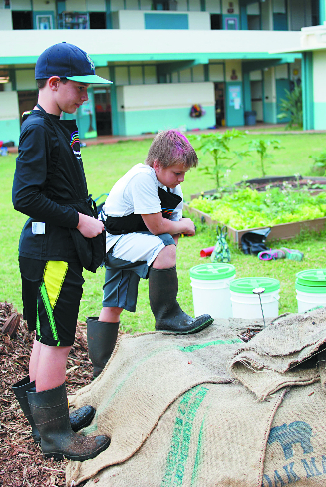Lanikai School Zero Heroes Worm Into Composting
“I like learning about thermophilic bacteria,” proclaimed a Zero Heroes student from Lanikai Elementary Public Charter School. It’s true that the group’s fifth-graders not only tell you what these bacteria do and why they’re important in the vermicast process, they also pronounce the name correctly!
Henry Cullison (left) and Judah Walker check the internal temperature of their compost mound. Photo by Nicole Kato, nkato@midweek.com.
Directed by Mindy Jaffe of Waikiki Worm Co., Zero Heroes has spurred the school to becoming a zero-waste campus while learning the composting process and how it keeps the planet healthy. The group started its hot compost piles three weeks earlier.
And hot seems to be an understatement. Those thermophilic bacteria are heat-loving little guys, according to the children, and they break bonds at a rate that causes extremely high heat — about 150 degrees.
“It’ll keep that high temperature for several weeks,” explained Jaffe. “That will kill any of the pathogens and weed seeds and prepare it for the next phase, which is when the bugs come in.”
This is the thermophilic phase of the hot-compost operation, which produces compost in a shorter time than the traditional method. During this phase, the school is able to recycle about 85 percent of its food waste. The other 15 percent goes to its earthworm colonies.
Worms occupy bins displayed around campus — Big Blue and the Mulberry Gang. Big Blue accepts about 50 pounds of food waste a week, and the Mulberry Gang closer to 25 pounds. Lanikai’s worm bin capacity is the largest of any school on the island, according to Jaffe.
“They just invested in plenty of worms because their food is so fresh. It’s not processed, greasy stuff,” she said. “It’s all good, locally produced, organic food, and it’s very worm friendly.”
Lanikai started its worm colonies last August, and hot compost was added to spur the campus toward zero waste. “It’s pretty amazing,” Jaffe noted. “Not many schools can claim they are processing 100 percent of their food waste on their campus.”
Zero Heroes collect food waste during lunch and operate a separation station that divides the food into buckets. “A lot of people are just in the habit of tossing the rubbish,” explained Jaffe. The food waste is weighed after lunch and the numbers are reported to Environmental Protection Agency. On any given school day, the group collects about 50 pounds of food waste.
That’s the easy part, however.
Jaffe also keeps her elective class constantly learning about compost technology and other parts of the waste management system. “They’re getting some academics,” she said. “I make them keep logs and make charts.”
The group also gets to learn about the FBI (fungus bacteria invertebrates). The current lesson is thermophilic bacteria, but Jaffe said still more FBIs will be studied in the future.
“Once these kids have done this week after week after week, it probably will have built up their skills and their confidence and their reliability,” added Jaffe, predicting that as sixth-graders next year, they’ll be even better and should take charge of harvesting the compost.
A year from now, she’s confident that Lanikai Elementary will be producing all of its own input and creating all its own compost for the school garden.






